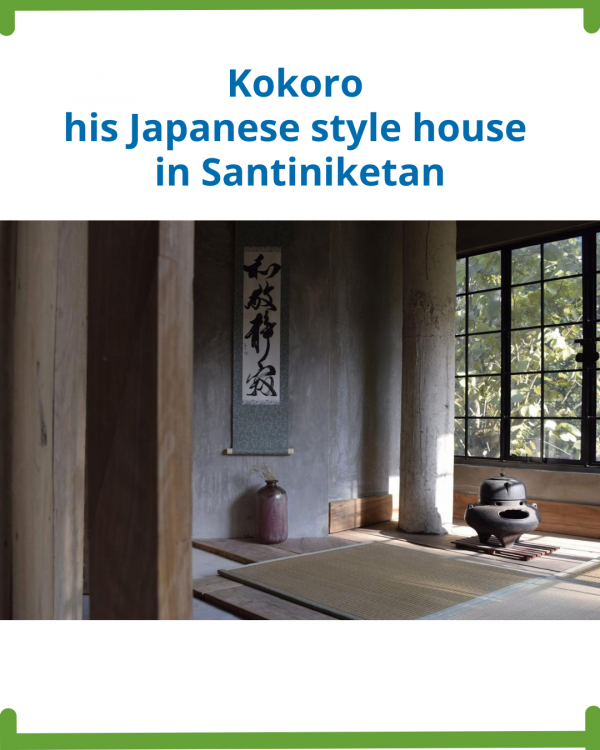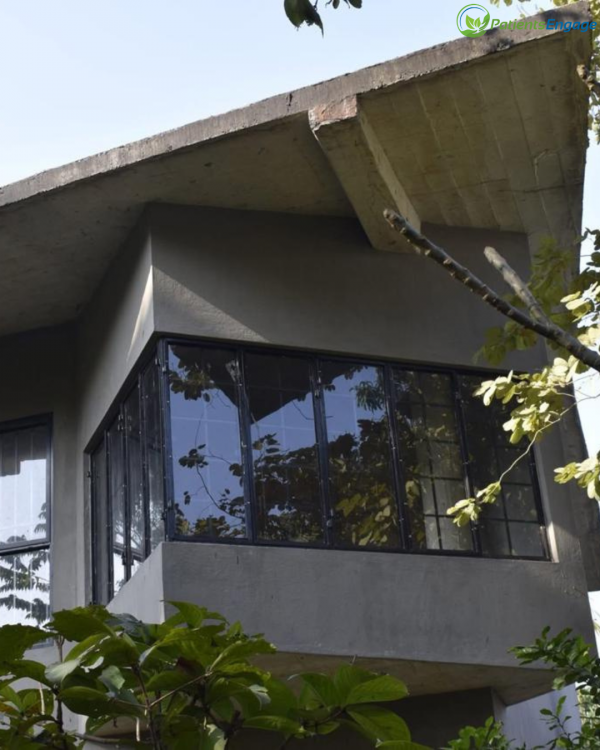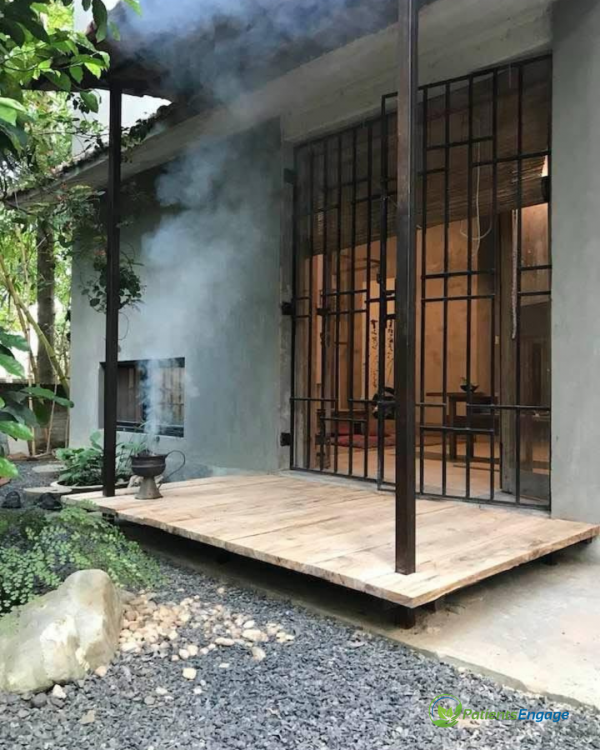
The Japanese art of Kintsugi is not only about repairing valuable broken ceramics with lacquer and gold, it celebrates the history of the breakage and repair which increases the value of the piece manifold. Nilanjan Bandyopadhyay, a great admirer of Japanese culture, celebrates the greatest accident of his life – Thyroid Cancer, the challenges of which he has endured over 26 years and counting.
A special officer of Rabindra-Bhavana, Visva Bharati, Nilanjan is a respected scholar, writer, and poet.
In Kokoro, his Japanese-style house in Santiniketan, Nilanjan uses his free time nurturing his Japanese garden, playing the piano, experimenting with Bengali calligraphy in the Japanese style, and greeting guests as a tea artist to the Bodhi Cha Utsav. Anyone who sees him like this would not realize how difficult it has been.

More pictures below
You were quite young when you were diagnosed with cancer... which year was it and what were the earliest symptoms?
I had a lump in my throat, my voice was turning hoarse, I had trouble breathing, I had weight and hair loss. A doctor in Calcutta suspected it was cancer and recommended further tests. But I was then 24, life was full of promise. I had got the opportunity to study in Japan and was so excited that I ignored the doctor's warning. Didn’t do the tests and went off to Japan. Something I regret to this day. When I realized, it was already too late.
This was some nine months later in 1999, while I was still in Japan. Things took a turn for the worse. My friends and teachers, especially renowned Indologist and Tagore scholar Kazuo Azuma, his wife Keiko Azuma, and journalist friend Fuminori Mitomo, became very concerned. They took me to various doctors. A biopsy was done. But they wouldn't tell me anything.
In Japan, doctors don't tell patients everything. They sent a sealed envelope with the biopsy report to Tata Memorial in Mumbai. That’s where malignancy was confirmed. The kind of cancer I have is known as medullary thyroid carcinoma (MTC).
How did you react?
Of course, I was devastated. In the beginning, all I could think of was how everything I loved had been cruelly snatched away from me forever. I would never be able to return to Japan, to my dear friends and teachers. The beautiful land, the art and culture, the cuisine, the roads, houses, gardens, library, would all recede out of reach. But over time, I have realized that cancer may be scary, it may cause intense suffering and even be fatal. But medical science also has advanced techniques to keep it in check. So, one has to live with it, making sure that it doesn't hamper one's quality of life.
And you did go to Japan again…
Yes, 26 times. My friends and mentors have visited me in Santiniketan. Incidentally, my house Kokoro was designed by a Japanese architect. Kokoro, meaning heart, is my tribute to Tagore's love for Japanese culture and way of life, which is also my passion and subject of research.
How did your parents take the news?
My parents have always been very strong and supportive. Through all these years of pain, fear, despair... they have been with me always. My father passed away recently but my mother is here. They are good human beings and their sacrifices for me are immense. Nothing would be possible without them. As long as they could, my parents accompanied me to Mumbai for surgeries and treatment. In Mumbai, finding places to stay was nearly impossible. During the first surgery a relative allowed us to stay in a house. But there was no furniture, nothing. So, we slept on the floor. My mother cooked... it was very tough for my parents. We lived there for a little over a month with minimum amenities. In later years, some friends stepped in to help. And I went with them to Mumbai.
Where was the first surgery? Weren’t you terrified?
Yes, I was very scared. This was in Mumbai, 1999. I had total thyroidectomy, under general anesthesia, but the post-operative pain was excruciating. It continued for two or three weeks.
To live without the thyroid gland, didn’t you need special medicines and maybe hormone replacement?
No. I just take one Eltroxin tablet daily.
Did the doctors warn you that the disease may return?
Yes. They explained that this particular type of cancer recurs frequently.
How did you discover that there has been a recurrence? When and where was this?
I was again in Japan when my lymph nodes swelled up. There was a physical examination and blood tests to check calcitonin and CEA levels. At a later stage, the doctors used modern imaging techniques like PET and DOTA PET CT scan (also known as a Ga-68 DOTA NOC scan) to detect and evaluate the progression.
How far had the disease progressed? What was done to curb it?
The disease had spread by distant metastasis affecting several parts of my body, namely my lungs, liver, femur bone, vertebrae and aral plates. Between the first surgery in 1999 and 2014 I have had eight other surgeries. I have also had several cycles of nuclear medicine, radiations… and now I am undergoing a round of oral chemotherapy – I have to take Cabozantinib at only 20 mg per day because my body is unable to stand higher doses.
You must have endured immense pain…
Yes, postoperative, the nine surgical procedures were extremely painful. Towards the last few surgeries, the pain management was slightly better. But the nuclear medicine therapies were also painful. These were injections given slowly over six hours. That hurts. Your arms swell up and you feel nauseous. But what can you do? You know that this is part of the deal. If you can bear the pain, you will be well again for some more time.
Do you still experience pain…
I have pain in my bones; I find it difficult to eat and difficult to breathe.
Are there many restrictions on your diet?
Nothing unusual, just whatever is necessary to increase immunity and keep one strong and healthy. I was asked to eat a lot of fiber, but I don't follow rules too much. I eat whatever I like because I believe that if I have a craving for something, my body is demanding that particular thing. But I always eat in moderation because through my life’s experiences I have learnt that anything taken in moderation cannot harm the body.
Did you need psychological counselling or physiotherapy?
Neck physiotherapy was advised but no practitioner is available here in Bolpur Santiniketan. So, I tried to help myself on the basis of YouTube videos and online resources. Counselling was not necessary.
But cancer patients often have to fight depression…
To tell the truth, I am unwilling to see myself as a patient. I have always done everything I wanted to, regardless of cancer.
Yes, sometimes I wonder why this had to happen to me when there are so many healthy people around. But it doesn't help anyone to mope over what could have been but didn't. It is no good feeling miserable and depressed and remain confined to bed or stay indoors. Instead, it's best to accept what has happened to you. Understanding that these are difficulties you have to live with and finding new sources of joy every day is helpful.
In Japan, they have this concept of Ikigai (meaning a reason for being), which is gaining popularity in recent times, and I believe this should be developed here too. Basically, it is about setting yourself goals. Say you pledge to devote this day to something you love. You will not only derive pleasure from the engagement, but it will also take your mind off personal discomfort and fear of death.
Would you say that cancer has forced you to become more creative?
No no, I have always been very creative. In fact, you may say that my creativity, this desire to express myself through different media has kept me from being overwhelmed by my illness.
You see, suffering is always a given in human life. Even the healthiest individual goes through occasional pain and discomfort.
Have the doctors said the growth has been arrested for now?
No, the growth has not been completely arrested. Variables keep changing.
What can be done? What if there are better treatments available in other countries, would you go? Wouldn’t you like to stay where medical assistance is more easily available?
India kept me alive for 26 years and I trust our medical systems. For me, all treatment has been here in Kolkata and Mumbai. And I feel cancer management in India is exemplary and definitely at par with international standards.
It is possible now to monitor the sickness and take steps to stay well.
This type of cancer (MTC) is supposed to be hereditary. Has anyone else in your family been tested?
My sister and nephew have been tested with negative results.
Very good to hear. Any messages for our readers? Maybe... a Bengali haiku takeaway from your crisis?
Noshto hoy na jibon
Shudhu koshto hoy
(Life is never a waste
Just hurts)


As told to Sebanti Sarkar






